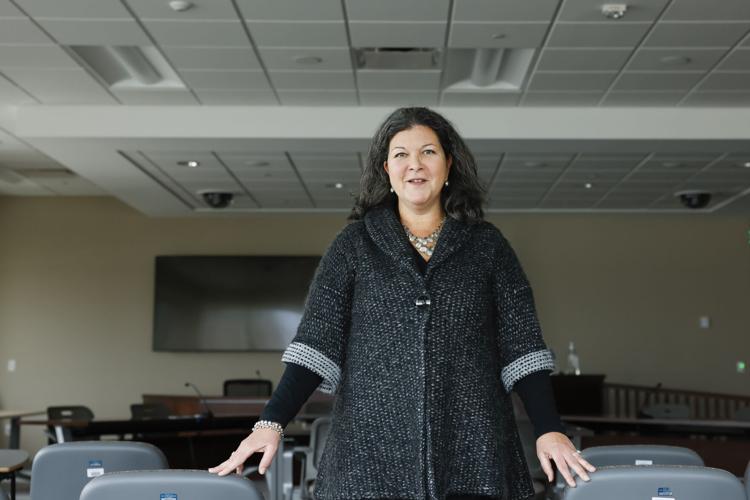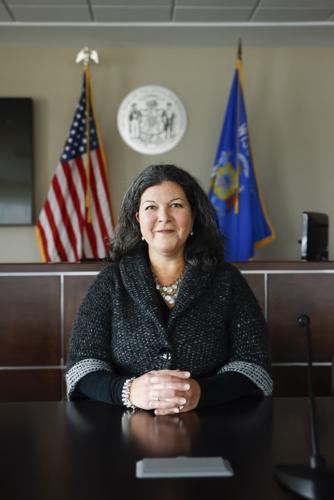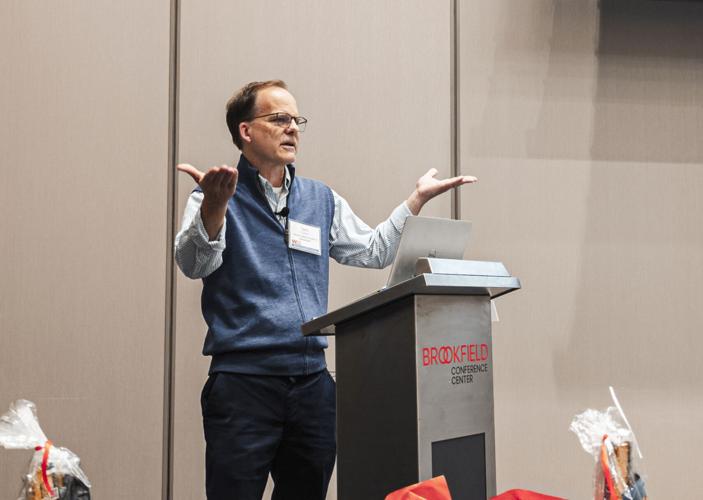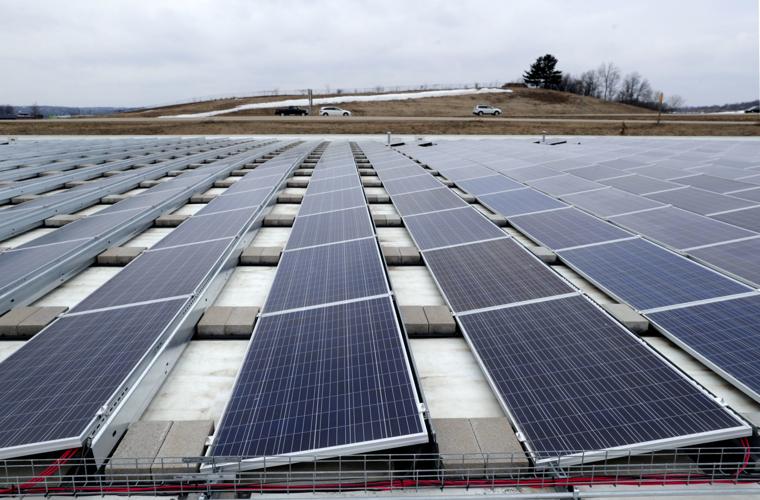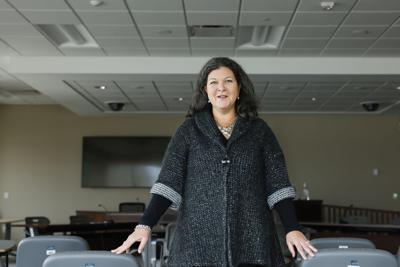When an electric, gas or water utility in Wisconsin wants to build a facility, make infrastructure changes or adjust the rates they charge for service, they come before three regulators on the Public Service Commission.
Rebecca Cameron Valcq is one of the three, and for five years she's led the commission. She knows its work is complicated and hasn’t been well understood by the public and has sometimes joked that it's “the most influential agency you’ve never heard of.”
She aimed to change that.
“I wanted to come in and sort of demystify what the PSC does. I wanted to demystify what the energy industry means to everyday people,” Valcq said.
And she did just that, according to industry sources who spoke to the Cap Times about Valcq’s legacy as chair of the commission.
Since her appointment in 2019, Valcq has literally brought the commission to Wisconsin communities for listening sessions and conducted outreach initiatives to bring more people to the table on commission business. Simultaneously, during Valcq’s tenure the regulators oversaw a massive expansion of renewable energy in Wisconsin and over $1 billion poured into the state to upgrade internet service for hundreds of thousands of residents.
Valcq announced last month that she’d be stepping down from her position. Her last day as a utility regulator was Friday.
She’s commuted from Milwaukee to Madison throughout her time at the agency. Valcq has two young daughters and while she doesn’t yet know what is next, she said she decided now was the right time to step away both personally and professionally.
“We really accomplished a lot in the last five years,” Valcq said.
Before joining the commission, she spent 20 years as a lawyer, representing WE Energies, one of the state's largest investor-owned utilities. Valcq initially faced some criticism for her past.
“People just assumed that I was going to be a rubber stamp for the utilities,” Valcq said. “For me, it was my passion for and my understanding of the utility industry that made me want to come in and open the door and explain to other people why it's so important.”
Valcq instead championed making the little-understood regulatory body accessible to more Wisconsinites and prioritized issues affecting low-income customers.
Tom Content shared those initial concerns about Valcq’s past. As the executive director of the Citizens Utility Board, a residential and small business consumer advocacy nonprofit, he appears before the commission regularly. Content now believes Valcq was balanced and tried to “thread that needle” between the competing interests that came before the commission.
“Which is not an easy job,” he said.
Making the commission accessible
When a matter comes before the Public Service Commission, individual people — but more often organizations — have the opportunity to “intervene” and submit public comments. Those who do often are the same small number of “frequent fliers” — utility companies, environmentalists, renewable energy advocates, residential and industrial customer protection groups.

Rebecca Cameron Valcq said she has worked to bring the Public Service Commission closer to utility customers, sometimes literally.
Valcq knew folks beyond those groups were affected by utility policy and tried to get more people involved in the decision-making process through roundtable meetings and listening sessions across Wisconsin.
The commission’s outreach under Valcq was directed toward organizations like the Urban League of Greater Madison and Walnut Way Conservation Corps that represent communities the regulators hadn’t previously heard from.
The commission offers intervenor compensation, or financial assistance, to groups for their involvement in agency matters to pay for attorney fees, clerical costs, travel and more. The amount of intervenor compensation awarded has increased as the commission’s received more applications since 2022.
“Chair Valcq really spearheaded efforts to expand the number of entities involved in important PSC discussions,” said Kathy Kuntz, director of the Dane County Office of Energy & Climate Change. “We’re in the midst of a major transformation in how we make and use energy in this nation and that will affect everyone. So it’s appropriate that lots of groups — local governments, neighborhood associations, faith groups — participate in the discussions at the PSC.”
During Valcq’s tenure the commission began streaming its public meetings on YouTube, something she said is essential for more people to participate in the regulators’ work.
Efforts to make the agency more accessible to more Wisconsinites worked, said Heather Allen, director of policy for Wisconsin at Elevate, a nonprofit that retrofits housing for energy efficiency.
“There were more groups participating in these last couple of rate cases than there ever had been before,” she said. A rate case is when utility companies ask the Public Service Commission for permission to adjust their prices.
“Ultimately, I think it will lead to decisions that better reflect the needs of Wisconsin,” Allen said.
'Energy burden' becomes priority
Commissioners make decisions based on the specific cases before them. But there are ways they can signal their priorities, said Brett Korte, staff attorney at Clean Wisconsin, an environmental advocacy organization.
“There's a lot that the commissioners can do to kind of show the utilities where they want them to go,” Korte said.
Addressing energy burden — the amount someone pays for utilities relative to their income, a burden often higher for low-income people — was a priority for Valcq the last five years. She opened an “investigative docket” on affordability, an information-gathering exercise where stakeholders weigh in on a topic to inform the commission’s decisions.
Within the last four years the agency also launched investigations into the potential for income-based payment options while also approving bill forgiveness programs designed by utilities.

Tom Content, executive director of the Citizens Utility Board of Wisconsin, said Rebecca Cameron Valcq's work on the Public Service Commission put to rest any concerns about her background as an energy industry lawyer.
Content, from the Citizens Utility Board, said that in 2021 the commission began doing something his organization had been urging the PSC to do: require utility companies to submit energy burden analysis reports every year.
“If you don't measure it, you can't manage it,” Content said.
That effort led to positive change, he said. In the last three years during utility rate case proceedings, he said, “we've seen utilities respond and propose new initiatives to try to address affordability challenges on the part of customers.”
Valcq also made it a priority to hear from those representing Wisconsinites who struggle to pay their gas and electric bills.
Christa Westerberg is an attorney who represents Walnut Way Conservation Corps and Blacks for Political and Social Action of Dane County, groups that advocate for equitable community development and recently began appearing before the commission in rate cases.
“There's been generally an interest in understanding the impact of higher utility bills on lower income customers and whether those can be mitigated through changes made during rate proceedings,” Westerberg said.
Last year when the state’s five largest utilities came before the commission asking to raise the cost of electricity, regulators brought down the amount of the rate increases by a collective $128 million.
The commission has also curbed the utilities’ return on equity — or profit margin — saving Wisconsin residents $95 million statewide since 2023, according to Content.

High speed internet often requires new infrastructure across the state. Wisconsin's Public Service Commission is doling out over $1 billion in federal grants to expand the broadband service.
Renewable energy, broadband advances
Valcq’s tenure at the Public Service Commission coincided with major infrastructure changes in a few ways, specifically the build out of renewable energy generation and broadband — high speed internet service delivered directly to customers homes via transmission technology.
“She led the agency during one of the fastest-changing periods in the whole utility sector in more than 100 years,” said Content. “And she also led the agency during a pandemic.”
Renewable energy investments by electric utilities have ramped up. During the last five years, the commission approved 3,976 megawatts of solar projects in the state, enough energy to power nearly 1 million homes.
“We're sad to see her go,” said Sam Dunaiski, executive director of RENEW Wisconsin, a renewable energy advocacy group. “Her experience and her dedication to renewable energy is certainly something that may be hard to replicate going forward.”

Madison Gas & Electric solar panels are seen on Middleton's public works operations center in March.
Wisconsin’s largest utilities have been working to replace their fossil fuel plants with renewable energy, specifically solar. Before breaking ground on new energy generation, the companies must present their plans to the Public Service Commission for approval.
“Chairperson Valcq has been instrumental in shaping Wisconsin’s energy future. Her ability to drive change has been transformative for both the PSC and the state,” said JP Brummond, president of customer and community engagement at Alliant Energy. “Through her effective management and bold vision, she has strengthened access to safe, reliable, and cost-effective energy services for all Wisconsin customers.”
Additionally, during Valcq’s tenure, Wisconsin received over $1 billion for broadband through the federal Bipartisan Infrastructure Law — and the Public Service Commission has been in charge of doling out the money as grants. During Valcq’s time at the agency, the PSC has allocated $306 million to 357 projects, which resulted in 395,000 homes and businesses having new or improved high-speed internet service, according to the commission.
When tasked with carrying out the state’s ambitious broadband goals, Valcq again focused on the public’s needs.
“When we found out that Wisconsin was being allocated more than a billion dollars for the expansion of broadband infrastructure, we got in our cars and literally drove across the state to conduct in-person listening tours,” she said.
In those 11 sessions, commission staff members heard from Wisconsinites about the challenges that come with the high costs of internet service and how broadband expansion could open up opportunities in telehealth, remote work, tourism and economic development.
“We learned that what may work in Bayfield might not be the solution in Darlington,” Valcq said. “We wanted to hear from local residents, business owners and units of government about where they need investment so that we can ensure the public dollars are going exactly where they need to go.”
The work to connect Wisconsinites continues, with the commission announcing more grants this week to support initiatives that improve telecommunication access and affordability.
Valcq said access is only one part of the challenge to getting Wisconsinites online. She wants to see consumer protections to ensure residents can pay for the internet services made available.
“You cannot be a fully functioning part of society without access to that service,” she said, “and we know that it is not affordable for too many people within the state of Wisconsin.”
Public Service Commission turnover

Kristy Nieto will complete Rebecca Cameron Valcq's term on the Public Service Commission, which expires in March 2025.
The announcement of Valcq’s departure was made three weeks ago, days before the Wisconsin Senate removed her colleague Commissioner Tyler Huebner for political reasons — with some lawmakers claiming he was an activist.
Valcq said the move by the Senate was disheartening and ultimately a distraction.
“If commissioners are put on commissions and feel that they are subject to the political winds, then those decisions are going to be based on something other than the facts that are in the record,” she said.
Summer Strand, who Evers appointed to the commission last year, will succeed Valcq as chair. Kristy Nieto, division administrator for energy regulation and analysis at the commission, will complete Valcq’s term that ends in March 2025. The third commission position — Huebner’s — is vacant, awaiting an appointment by Evers.


